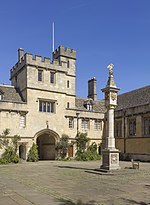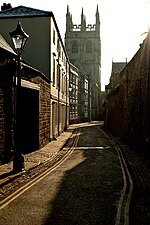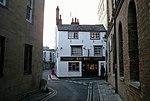Oriel College () is a constituent college of the University of Oxford in Oxford, England. Located in Oriel Square, the college has the distinction of being the oldest royal foundation in Oxford (a title formerly claimed by University College, whose claim of being founded by King Alfred is no longer promoted). In recognition of this royal connection, the college has also been historically known as King's College and King's Hall. The reigning monarch of the United Kingdom (since 2022, Charles III) is the official visitor of the college.The original medieval foundation established in 1324 by Adam de Brome, under the patronage of King Edward II of England, was the House of the Blessed Mary at Oxford, and the college received a royal charter in 1326.: 1 In 1329, an additional royal grant of a manor house, La Oriole, eventually gave rise to its common name. The first design allowed for a provost and ten fellows, called "scholars", and the college remained a small body of graduate fellows until the 16th century, when it started to admit undergraduates. During the English Civil War, Oriel played host to high-ranking members of the king's Oxford Parliament.The main site of the college incorporates four medieval halls: Bedel Hall, St Mary Hall, St Martin Hall, and Tackley's Inn, the last being the oldest standing medieval hall in Oxford.: 2 The college has nearly 40 fellows, about 300 undergraduates and some 250 graduates. Oriel was the last of Oxford's men's colleges to admit women in 1985, after more than six centuries as an all-male institution. Today, however, the student body has almost equal numbers of men and women. Oriel's notable alumni include two Nobel laureates; prominent fellows have included founders of the Oxford Movement. Among Oriel's more notable possessions are a painting by Bernard van Orley and three pieces of medieval silver plate. As of the 2020–21 academic year, the college is ranked twentieth in academic performance out of thirty colleges in the Norrington Table, having topped the table in 2015–16.











